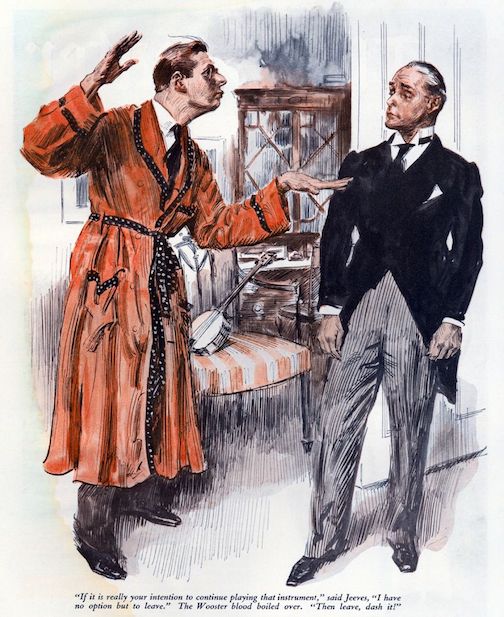The title of this essay comes, perhaps not unexpectedly, from P.G. Wodehouse. One of Wodehouse’s immortal characters, Bertram Wooster, tells Jeeves, his equally immortal butler, that he (Bertram) is not “the old merry self this morning.” We find the reason for this angst in the first sentences of the novel, Very Good, Jeeves. It reads:
It is the morning of the day on which I was slated to pop down to my Aunt Agatha’s place at Woollam Chersey in the county of Herts for a visit of three solid weeks, and, as I seated myself at the breakfast table, I do not mind confessing that the heart was significantly heavy. We Woosters are men of iron, but beneath my intrepid exterior at that moment there lurked a nameless dread.
Bertram thought that whenever he had anything to do with this formidable Aunt of his, things went rapidly downhill. Even Jeeves, who was usually up on the aberrations of mankind, was not sure why this foreboding existed. Bertram knew that his aunt considered him a “pain in the neck,” which, to give Aunt Agatha her due credit, seems to have been the case.
Some dreadful things can be named. We fear death. We dread the arrival of winter. “Nameless” dreads need not be totally irrational. Some things ought to cause worry. Bertie Wooster feared what might happen at Aunt Agatha’s. But he could not yet put his finger on what it was. He would drive his spiffy two-seated roadster to county Herts to find out. And that dread provides the core plot of the novel.

Aunt Agatha’s ascertained that her nephew was a frivolous, empty-headed young man who needed to marry and settle down. Usually on arrival at Woollam Cheresey, Bertie would find that Aunt Agatha, ever the matchmaker, had also invited some nubile, polished, wealthy, but dreamy if not dizzy, debutante. The plots of Wodehouse’s novels are masterworks on how to escape the clutches of these usually lovely young ladies. Their characters were such that, on espousal to Bertie, they would spend the rest of his days trying to reform him into something he did want to be. His escape is usually a close call.
Where did Wodehouse find all his plots? He wrote some hundred novels. When asked, he made the following observation: “I believe that there are two ways of writing novels. One is mine, making a sort of musical comedy without music, and ignoring real life altogether; the other is going right deep into life and not caring a damn.”
The second alternative, the “not caring a damn,” would mean that we do not flinch at what we find in real life. We call it as it is. We do not avoid facing the fact that things go wrong. When they do go wrong, we are usually responsible for their twists and turns. They do not happen without our input.
Aristotle tells us that tragedy is “an imitation not only of a complete action, but also of incidents arousing pity and fear” – the things we “dread.” A tragedy is an imitation, not of persons, but of an action of sufficient gravity, with a beginning, middle, and end. I do not look upon Wodehouse’s “not caring a damn” for what is “deep” in human nature to be a washing of his hands of the bleaker side of humanity. Dreaded things do happen to flawed but noble souls.
But even though sadness is found in the life of the comedian, we think that comedy deals with less serious topics. We expect to be amused, to laugh at what we behold carried out before us. For Aristotle, comedy is an “imitation of men worse than the average; worse, however, not as regards any and every sort of fault, but only as regards one particular kind, the Ridiculous, which is a species of the Ugly. The Ridiculous may be defined as a mistake or a deformity not productive of pain or harm to others.” Aristotle’s definition of comedy probably will not cause too many laughs on “Comedy Central.” But it does shed light when read in the context of Wodehouse’s way of writing his own novels.
Wodehouse explains that his novels are like a “musical comedy without the music.” That is a pretty good definition not at all out of line with Aristotle’s definition of no pain or harm. Wodehouse also wrote musical comedies. All his plots could be set to music.
Comedy sees how things are out of line. It can only do this by keeping in mind what is not out of line. Laughter is caused when we see how things that seem to go together do not. No harm is done; laughter is redemptive. It allows for things to go wrong but only in the context of knowing what is right. Dread and comedy are opposites in an imperfect world.
*Image: Wooster and Jeeves, by James Montgomery Flagg (Cosmopolitan, January 1934). The caption reads: “If it is really your intention to continue playing that instrument,” said Jeeves, “I have no option but to leave.” The Wooster blood boiled over. “Then leave, dash it!”














